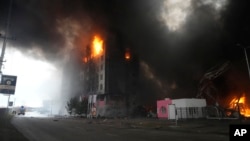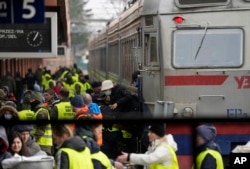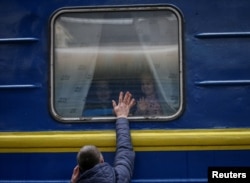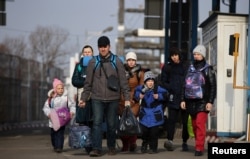Another night of flight for some and fight for others. Another night of missiles and rockets raining down on towns large and small. Another night of anguish, fear and courage.
The war has been unrelenting since the first cruise missiles struck Kyiv and other towns and cities across Ukraine in what has become an existential conflict for the country. For Russian President Vladimir Putin, some say the now weeklong operation has morphed from a war of choice into possibly a struggle for his political survival.
Hundreds of thousands of Ukrainians are also battling for survival — not political in their case but corporal as they try to navigate themselves or their families to safety. At jam-packed train stations across war-wracked Ukraine, Europe’s second-largest country, families wait patiently, bundled up against the cold, for trains that arrive late or never appear — and even when boarded, destinations are uncertain.
After one week of merciless war, the United Nations estimates more than 1 million Ukrainians have flooded across borders into Poland, Slovakia, Hungary, Romania and Moldova. Hundreds of thousands are displaced inside Ukraine and making difficult journeys to reach sanctuary. The war has already likely passed the 1.3 million uprooted in the years-long Balkan wars of the 1990s.
Among the displaced is Mykola, an electrical engineer, who until a week ago was working on large-scale projects to modernize Kyiv’s energy-delivery systems. A bulky man, made more so by the thick brown canvas jacket he’s wearing, he stamps his feet and chain-smokes outside a shabby hotel working out how to get his wife and young son as well as the family of a friend over the border.
“No one really thought this war would happen,” says Mykola. “Most people thought it would just be some bigger fighting in the east, in Donbas, and most people thought, ‘Well, let Russia have the Donbas as the only people left there now are probably pro-Russian and separatists,” he added.
“You know a week ago, I had a life and a good home, and it was normal and predictable, and we had worked hard for that and now…” He trails off, lost in thought. And then he spits out: “I never thought Putin would do this,” and then again falls silent, brooding.
On Wednesday, Mykola, along with his wife and toddler and his friend’s partner and her children, made it into Slovakia, passing through professionally guarded checkpoints, or block-posts as Ukrainians call them, around Lviv, and then navigating the smaller, more improvised village checkpoints, manned by jumpy, suspicious locals toting single barreled shotguns.
Mykola, a dual Ukrainian-Canadian citizen, was allowed to leave Ukraine because he used his foreign passport. But most Ukrainian men aren’t allowed to depart. Under the terms of the martial law declared by Ukraine’s President Volodymyr Zelenskyy, men aged 18 to 60 must remain, making them available for enlistment. And so, men fearful of what will happen to their families once abroad, part with their families at Lviv’s crowded railway station, or wave confused children off near borders.
“At first, the kids thought all this was an adventure, but after days they now sense the gravity of the situation and their faces have changed,” said one father, Alexander, a teacher from Kharkiv. That certainly seems the case with one little boy, from whom I can’t coax a smile or a wave or any acknowledgment whatsoever. He is a statue of misery.
For the wives and children of the men left behind, the partings are compounding the anguish of leaving home. Olena has two children, a baby and a 9-year-old girl. They are from Dnipro, a city in the east of the country which is bracing for a Russian assault. She told me they waited more than a day at the train station to start an arduous and halting trip to get to Lviv, where she plans to find a way to Poland, where friends have said they will help. Some of the trains they have taken have no toilets.
“My husband decided to stay and fight,” she tells me tearfully. She shifts the squirming baby in her arms. “I don’t know what will happen to us, but we will have to find somewhere to live and maybe Poland will help with money. I don’t know.”
Many men are driving their families from east to west and entrusting them with relatives and friends in villages, hoping war won’t reach them, and then returning to fight. Among them is Glib, a reservist yet to be called up. “The war is a national tragedy that has shattered into millions of personal tragedies,” he tells me. “I am so divided. I am worried about leaving my family alone, but I must fight.”
Like many Ukrainians, he criticizes Zelenskyy, a onetime TV actor, for not mobilizing Ukraine earlier for war and complains that all the reservists — 900,000 — should have been called up weeks ago in readiness. But like many Zelenskyy critics, he joins in the chorus of praise for Ukraine’s leader, now saying he’s “inspirational.”
Glib adds, “Maybe he’s drawing on his skills as an actor — maybe he is not a good manager, but as a communicator he’s excellent. And he seems now to be allowing managers to manage.”
The personal stories jostle for attention with the national story, of the grand narratives of battles and skirmishes won and lost. In the maelstrom, millions of lives are impacted as people try to survive or just get a footing in a world turned upside down.
And there are too many personal stories to chronicle. There’s the tale of three Ghanaians months short of completing their medical degrees in the town of Poltava, once the venue for a defining 18th Century battle in the Great Northern War between Russia’s Peter the Great and Sweden’s Charles XII for mastery of eastern Europe. Some military strategists have hazarded Poltava may again see a titanic fight in the coming days, weeks or months.
The Ghanaians have made their way to west Ukraine and are wondering not only how to slip over the crowded borders, but what it will involve to finish their education. “What do I do now?” Peter said, adding, “I have worked so hard to get to where I am, or was. Now what?”
African evacuees allege they are being treated unfairly and sometimes can’t get aboard trains or buses. A U.S. official told me they have been tracking the claims, which are of “huge concern.”
“Nigerians were the second largest group of foreigners leaving Ukraine [Tuesday]. I think there was no doubt there were problems for them,” he said.
Part of the problem in Ukraine seems to be that women and children are being prioritized on trains and buses and many of the Africans trying to leave are men, say the official and aid workers. Foreign men are not always being distinguished from Ukrainian men barred from leaving, they say.
Then there are the stories of Libyans, more than 1,000 of them, who have been living in Ukraine, mostly for university study, often in Poltava and Kharkiv, where a famous university was bombed on Wednesday.
The Libyan government — no stranger to conflict — has been organizing buses to get them to the borders and chartering flights to Libya. “So, from one war zone back to another,” Hanadhi, a medical student, quips. Wearing traditional Libyan clothing, she and four other Libyan women, one in Ukraine for eye surgery, stand out from the Ukrainian crowd, but seem so inadequately dressed for frigid weather.
I talk with them at the Slovak border, where I, too, will make a crossing to grab a break before returning to report again. Like the Libyans, I have driven from Lviv, climbing snow-blanketed roads into the Carpathian Mountains, the destination for centuries of those from one or another ethnic group seeking safety. On Saturday, a rabbi in Odesa evacuated 300 Jewish orphans on three buses to the mountains, where my ancestors, too, a century ago, fled on their way to exile.
The Ukrainian border guards say their country may not exactly be winning but in effect it is winning simply by not losing. They ask me whether I will bring missiles when I return. “I don’t do missiles; I do words,” I say.
They seem disappointed.







